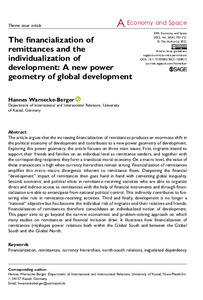The financialization of remittances and the individualization of development: A new power geometry of global development
| dc.date.accessioned | 2022-07-11T12:11:56Z | |
| dc.date.available | 2022-07-11T12:11:56Z | |
| dc.date.issued | 2021-08-23 | |
| dc.identifier | doi:10.17170/kobra-202205056134 | |
| dc.identifier.uri | http://hdl.handle.net/123456789/13987 | |
| dc.description.sponsorship | Gefördert im Rahmen eines Open-Access-Transformationsvertrags mit dem Verlag | ger |
| dc.language.iso | eng | eng |
| dc.rights | Namensnennung 4.0 International | * |
| dc.rights.uri | http://creativecommons.org/licenses/by/4.0/ | * |
| dc.subject | financialization | eng |
| dc.subject | remittances | eng |
| dc.subject | currency hierarchies | eng |
| dc.subject | north-south relations | eng |
| dc.subject | negotiated dependency | eng |
| dc.subject.ddc | 330 | |
| dc.title | The financialization of remittances and the individualization of development: A new power geometry of global development | eng |
| dc.type | Aufsatz | |
| dcterms.abstract | The article argues that the increasing financialization of remittances produces an enormous shift in the political economy of development and contributes to a new power geometry of development. Exploring this power geometry, the article focuses on three main issues: First, migrants intend to support their friends and families on an individual level as remittance senders, and together with the corresponding recipients they form a translocal moral economy. On a macro level, the value of these transactions is high when currency hierarchies remain strong. Financialization of remittances amplifies this micro–macro divergence inherent to remittance flows. Deepening the financial “development” impact of remittances then goes hand in hand with cementing global inequality. Second, economic and political elites in remittance-receiving societies who are able to organize direct and indirect access to remittances with the help of financial instruments and through financialization are able to emancipate from national political control. This indirectly contributes to fostering elite rule in remittance-receiving societies. Third and finally, development is no longer a “national” objective but has become the individual risk of migrants and their relatives and friends. Financialization of remittances therefore consolidates an individualized notion of development. This paper aims to go beyond the narrow economistic and problem-solving approach on which many studies on remittances and financial inclusion draw. It illustrates how financialization of remittances (re)shapes power relations both within the Global South and between the Global South and the Global North. | eng |
| dcterms.accessRights | open access | |
| dcterms.creator | Warnecke-Berger, Hannes | |
| dc.relation.doi | doi:10.1177/0308518X211038013 | |
| dc.subject.swd | Finanzkapital | ger |
| dc.subject.swd | Überweisung | ger |
| dc.subject.swd | Währung | ger |
| dc.subject.swd | Abhängige Entwicklung | ger |
| dc.subject.swd | Nord-Süd-Beziehungen | ger |
| dc.type.version | publishedVersion | |
| dcterms.source.identifier | eissn:1472-3409 | |
| dcterms.source.issue | Issue 4 | |
| dcterms.source.journal | Environment and Planning A: Economy and Space | eng |
| dcterms.source.pageinfo | 702-721 | |
| dcterms.source.volume | Vol. 54 | |
| kup.iskup | false |
Dateien zu dieser Ressource
Das Dokument erscheint in:
-
Artikel [1103]


